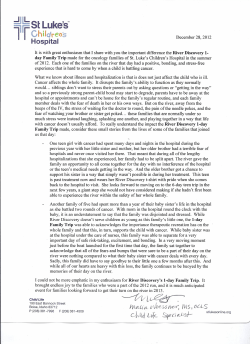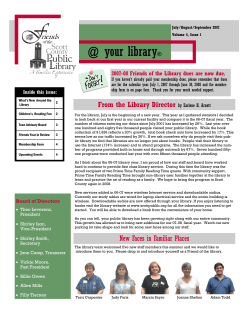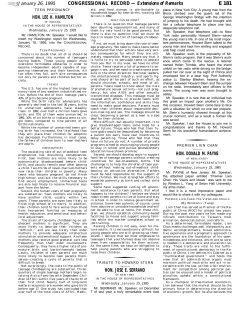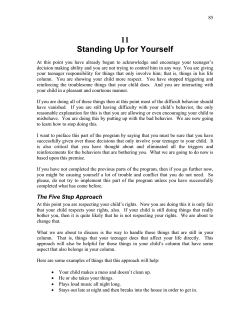
Parenting Your Out-of-Control Teenager
EXECUTIVE B O O K S U M M A RY www.gopll.com Tel. (800) 735-9525 : Fax (866) 839-4884 7 STEPS: TO REESTABLISH AUTHORITY AND RECLAIM LOVE Parenting Your Out-of-Control Teenager THE SUMMARY IN BRIEF by Scott P. Sells. PH. D. Table of Contents Introduction: Do You Know This Teenager? Step 1: Understanding Why Your Teen is Out-ofControl Step 2: Writing an Ironclad Contract of Clear Rules and Consequences Step 3: Troubleshooting: How to Think Two Steps Ahead of Your Teenager Step 4: Button Pushing: Why You Get Defeated Lose During Argument Step 5: Consequences to Stop Your Teenager’s 7 Aces of Disrespect, Ditching School, Running Away, Sexual Promiscuity, Violence, Threats of Suicide, and Alcohol and Drug Use Step 6: How to Mobilize Outside Helpers Like Friends, Neighbors, and Police Officers Step 7: Reclaiming Love Between You and Your Teenager A Final Step: What to Do If These Steps Fail Appendix A: Choosing the Right Counselor Do you know an out-of-control teenager or child? If you do, you are not alone. According to the U.S. Census Bureau, an estimated 11 million households contain teenagers who have exhibited serious problem behaviors such as violence at home or school, threats of suicide, chronic running away, truancy, teen pregnancy, and alcohol or drug abuse. These teens go beyond everyday problems and do not respond to traditional parenting methods. This book was written because current parenting books and counseling programs often do not address the special circumstances specific to the out-of-control teenager. Strategies are either too watered down or fail to show parents how to stop really serious behavior problems on a long-term basis. This book is based on a 4-year research study and contains the 7 critical steps you need to restore both love and limits with your teenager: Step One: Understanding Why Your Teen Misbehaves. Learn how your teen creatively uses things like their “7 aces” or being “drunk with power” to commit acts of parent abuse to defeat you each and every time you try to regain control of your household. Step Two: Ironclad Contracting Learn how your teen uses something called “literal disease” to make your current contracts fail and the concrete steps needed to overcome this problem and create a contract that actually works. Step Three: Troubleshooting: Understand how your out of control teen has a special ability called “enhanced social perception” to think two steps ahead of you and derail even your best-laid contract Step Four: Button Pushing: Learn how your teen skillfully pushes you hot buttons to defeat you during arguments and the 6 button busters you can use to win this game. Step Five: Stopping the 7 Aces: Choose from a recipe menu of creative consequences to stop your teen’s 7 aces of disrespect, ditching or failing school, running away, drugs or alcohol, sexual promiscuity, violence, or threats of suicide. Step Six: Working With Outside Helpers Learn how to mobilize outside helpers like friends, neighbors, ministers, police, and counselors to back you up and help you take charge of your household again. Step Seven: Reclaiming Lost Love: Understand how years of conflict have drained the softness out of your parent child relationship and the six strategies you need to reclaim lost love. www.gopll.com : Tel. (800) 735-9525 : Fax (866) 839-4884 Parenting Your Out-of-Control Teenager ™ 7 STEPS TO REESTABLISH AUTHORITY AND RECLAIM LOVE by Scott P. Sells. PH. D. What Makes This Book Unique? There are four important distinctions between this book and the other parenting books currently available: Detailed Step-by-Step Guide: Other parenting books do not contain the step-by-step detail that this book provides and parents need. For example, in Chapter 8, "Stopping Your Teenager's 7 Aces," I give the reader a menu of 14 customdesigned consequences to stop severe behaviors like violence, suicide, disrespect, truancy, and running away. The step-bystep procedures are then outlined in detail with short exercises to consolidate learning. Potential problems and pitfalls are also described with case examples to clarify key concepts. Workbook Exercises: This book contains short workbook exercises built right into the procedural steps of each new strategy. For example, in Chapter 8: Step 5-Running Away, parents are provided with an actual pawn ticket that they can hand to their teenagers stating that "one of their personal items will be sold or pawned if they run away again within the next seven days." Other parenting books for this population do not provide parents with these kinds of specific resources. Research-Based Model: Other parenting books do not have the support of a research-based model to back up their claims. This book and the principles contained within were the result of a research study with 82 families over a 4-year period. The research results are in Chapter 12 of my professional book entitled: Treating The Tough Adolescent: A Family-Based, Step-by-Step Guide (Guilford Press, 1998). "What if" Scenarios: One of parents' biggest fears is not knowing what to do if the unexpected happens or if Plan A fails to work. For example, what happens if you attempt to ground your teenager and he or she simply gives you "the finger" and walks out the door? Other self-help parenting books fail to provide the parent with any kind of contingency plans if what they recommend does not work. This book provides a detailed table of contingency plans for each consequence. How This Book Will Help Your Parents? Counselors, teachers, and other professionals have told me over and over again that this book really helps educate their parents on all the steps they need to regain control of their household. The parents love the step-by-step procedures that are outlined in detail along with the workbook exercises to consolidate learning. Potential problems and pitfalls or what to do if Plan A fails are also described with case examples to clarify each concept. There is also now a parent workbook and a video tape that you can order at www.difficult.net that visually shows each parent how to apply each step like button pushing and contracting or each technique like the 6 button busters or strategies to restore lost nurturance with their teenager. Since 60% of learning is visual and only 30% of learning is verbal, the book and tape are used to illustrate visually how to parent out-of-control teenagers. For example, one parent could simply not understand why they still loved their teenager but no longer liked them. The counselor then asked their parent to turn to page x of my book. The counselor and parent then used the timeline below to understand how and why the evolution from softness to the present day deep freeze of coolness and distance did not happen overnight. It took time to develop this kind of chill factor. The parent could then instantly see the big picture and most importantly did not feel judged or blamed in the process: 2 www.gopll.com : Tel. (800) 735-9525 : Fax (866) 839-4884 Parenting Your Out-of-Control Teenager ™ 7 STEPS TO REESTABLISH AUTHORITY AND RECLAIM LOVE by Scott P. Sells. PH. D. Timeline of Stages Leading to a Loss of Nurturance Your child becomes more and more rebellious as they get older and experience behavior problems on a consistent Stage 1 basis over a six-month period. Behavior Problems Stage 2 Negative Interaction As your child becomes a teen, they fail to comply with your requests more-often. Disrespect increases. As a result, lecturing & negative-interaction jumps from only 20% to 40% to an unbelievable 90% to 100% of the time. There is now only 5% to 10% of the time left over for soft love. Stage 3 Conditional Love In a last ditch effort to reconnect, parents tell their teen that outings or signs of affection will be based on how good their behavior was that week. Your teenager now mistakenly comes to believe that your love is no longer unconditional but conditional based on whether or not they display good behavior. Stage 4 Emotional Deprivation Emotional deprivation sets in. This means that a deep freeze occurs. Both you and your teen stop hugs or special outings. This is because you and your teen feel so "burned" by previous rejections that you both shut down and stop trying. Stage 5 Second Family Takes Over If your teenager does not receive nurturance in your family, he or she will look to an adopted "second family" of peers, gangs, or drugs. This becomes a problem when these friends are a negative influence on your teen’s heart, mind and soul. Stage 6 Parent and Teen Get Stuck In a Vicious Cycle Stage 7 If your teenager does not receive nurturance in your family, he or she will look to an adopted "second family" of peers, gangs, or drugs. This becomes a problem when these friends are a negative influence on your teen’s heart, mind and soul. As this rut continues, your teenager becomes more and more hardened inside. Over time, your teen develops an Teen Becomes inability to show remorse or empathy. If this remains unchanged into adulthood, they may develop what is called Hardened& Lacks an antisocial personality disorder. As adults, they will pass these problems onto their children where this timeline Remorse/Empathy may begin all over again. Other counselors and professionals are beginning to buy my book in bulk and leaving it on the coffee tables in their office. They are giving the book to parents to read for homework, requesting that they purchase it at their local bookstore, or selling it to their parents themselves. Since many of your parents, do not want therapy but rather a problem-solving approach you can “start where the client is” and give them this type of intervention through this book. www.gopll.com : Tel. (800) 735-9525 : Fax (866) 839-4884 3 Parenting Your Out-of-Control Teenager ™ 7 STEPS TO REESTABLISH AUTHORITY AND RECLAIM LOVE by Scott P. Sells. PH. D. A BRIEF SUMMARY Step 1: Understanding Why Your Teen is Out-of-Control Every journey begins with a first step. The first step on this journey is to answer the age-old question: “Why does your out-of-control teenager misbehave?” Parents ask me this all the time. You must first understand the “why” before you can figure out “how” to stop the problem. It is like the auto mechanic who works on your car. They must understand why your car makes those funny noises before they can fix the problem. Step 2: Write an Ironclad Contract of Clear Rules and Consequences One of the biggest reasons for your teen’s bad behavior is the fact that 90 to 95% of you have no written contract with your teenager. Your rules and consequences are verbal, off the cuff, or made up as they go along. For example, you may implement the rule of “no disrespect” but fail to specify what your teen does or says that is considered disrespectful. Your teen now has the perfect loophole and can argue: “It’s not in the contract! When this happens, it is as if your teen is a shark smelling blood in the water and you, the parent, quickly become the victim in the feeding frenzy. This chapter will show you the five reasons why your current contracts fail and how to make them suddenly work and work well. D•I•S•R•E•S•P•E•C•T The New & Improved Definition Jackie, I will now literally and exhaustively define the term “disrespect.” You will be considered disrespectful if you do any of the following things: 1) Use the word “no” or refuse to do what I ask the first time – Like clean your room, wash the dishes, feed the cat, etc. 2) Swear, yell, or use gestures like rolling your eyes or mumbling under your breath. 3) Mimic me in an unflattering manner. 4) Follow me all over the house nagging me when you don’t get your way. 5) Tell a lie (that I can prove is a lie.). As your mother, I reserve the right to add to this list at anytime if you come up with new disrespectful behaviors in the future. Love, Mom 4 www.gopll.com : Tel. (800) 735-9525 : Fax (866) 839-4884 Parenting Your Out-of-Control Teenager ™ 7 STEPS TO REESTABLISH AUTHORITY AND RECLAIM LOVE by Scott P. Sells. PH. D. Step 3: Troubleshooting: How to Think Two Steps Ahead of Your Teenager Out-of-control teens can defeat you and make you back down through a special gift called “enhanced social perception.” This means that your teen can play out in their head or write on paper as many different scenarios as necessary until they find a loophole in your rule or consequence. “I’m Two Steps Ahead” When 15-year-old Tonya received her punishment of “no phone use” for swearing at her mom, she went to her room to find a loophole. After diagramming several different plans on a sheet of paper, she finally decided on the best one. Tonya told her friends that she would call them at 1am in the morning when everyone in the house would be sleeping. Tonya instructed her friends on how to use a pillow to muffle the sound when the phone rang. Her plan worked beautifully. Tonya had no reason to stop swearing. She had found a loophole in her mom’s “no phone use” consequence. Tonya used her special skill of “enhanced social perception” to think two steps ahead of her. To prevent this type of situation, this chapter will show you how to “troubleshoot” by developing custom fit back-up plan for every “what if ” situation that you may encounter. For example, “what will you do if you sell your teen’s CD collection at a pawn shop as a punishment and you son countermoves by trying to sell your stuff?” These tough questions must be asked and answered ahead of time. Otherwise, your teen will be more than happy to do this job for you. Step 4: Button Pushing: Why You Get Defeated Lose During Argument Extreme behavior also takes place through “button pushing.” If you ask your teen to do something they don’t want to do, they often start pushing your “hot buttons” to make you angry or frustrated. For some of you, these “hot buttons” are swearing or rolling of the eyes. For others, it is statements like “I hate you” or “Your not my real father, I don’t have to listen to you.” Your teenager has an uncanny ability to know exactly what your buttons are and how to push them. Your teen knows that if they can successfully push your buttons, your judgment will be clouded. If your judgment is clouded, there is a better than average chance that you will back down or fail to follow through on a consistent basis. This is why your consequences don’t work. The consequence itself isn’t the problem. It is your delivery. You cannot be successful if you teen pushes your buttons and you push your teen’s buttons through lectures, criticisms, or attacks on their character. My Age Dropped Like a Rock – I Am Now My Son’s Age.” At the beginning of the argument, I was 45 years old, but after only 5 minutes of constant bickering, I felt that I was 30 years old. As we continued to argue, my age continued to drop. Before long, I felt like I was suddenly my son’s age [16 years old], and that we were two kids in the sandbox scrapping for power and control. When you are the same age as your teen in “button pushing years,” it is difficult to play the role of parent. It doesn’t matter how good your consequences look on paper. You will lose every time. This chapter provides a detailed description of how button-pushing works and the 6 button busters you need to stop it cold. www.gopll.com : Tel. (800) 735-9525 : Fax (866) 839-4884 5 Parenting Your Out-of-Control Teenager ™ 7 STEPS TO REESTABLISH AUTHORITY AND RECLAIM LOVE by Scott P. Sells. PH. D. Step 5: Consequences to Stop Your Teenager’s 7 Aces of Disrespect, Ditching School, Running Away, Sexual Promiscuity, Violence, Threats of Suicide, and Alcohol and Drug Use The best poker players seem to have a hidden ace up their sleeve to defeat their opponent at the precise moment they appear to be winning. In the same way, your difficult teenager will use the seven aces of disrespect, truancy/poor school performance, running away, teen pregnancy, alcohol or drug abuse, violence, or suicidal threats to defeat you and make you back down. You are defeated because each of these “aces” cause traditional rules and consequences to fail. For example, if you attempt to ground your teenager for disrespect, he or she can use the “ace” of running away to leave the house as soon as your back is turned or you go to sleep. In addition, aces like suicidal threats, violence, or drug abuse are potentially deadly or risk physical harm to yourself or others. You often back down out of fear. Fear that if you push too hard, your teen might kill themselves, become violent, or suffer a drug overdose and die. Teens understand these fears and the limits of traditional consequences better than you do. These 7 aces cause “parent abuse” or “teen terrorism” and are the single biggest reasons why you are unable to keep your authority long enough to stop your son or daughter’s extreme behaviors. To stop these “7 aces” you must come up with a consequence that is so bitter tasting to your teenager that they would rather give up the payoff of the ace (total freedom, special attention, controlling your household) than continue to suffer the punishment. This is no easy task. As your teenager gets older, there are fewer and fewer consequences they care about. The goal of this step is to provide you with a menu of consequences that your teenager will care about. For each ace, I have assembled the best recipes or consequences that I could find to help you stop each ace. Each ace has its own mini chapter of different consequences to choose from. For example, under the ace of truancy, you will see a consequence called “Working Collaboratively With Your Teen’s School” along with a set of step-by-step instructions. Step 6: How to Mobilize Outside Helpers Like Friends, Neighbors, and Police Officers There is a major unspoken crisis in this country. More and more parents are giving away their parental responsibility to what I call “artificial support systems.” Instead of turning to a “natural” support system of extended family, friends, neighbors, or ministers, parents are relying on an “artificial” support system of schools, police, judges, lawyers, hospitals, boot camps, medications, or probation officers. The implications of this decision can be disastrous. Your parental authority can be undermined when outsiders take over your role. Your teen can become even more out-of-control and powerful. Mrs. Daisy Scott, an elder spokesperson from an inner-city community in Savannah, Georgia, best describes how this happens: There is an old African proverb taught to me by my mother: “It Takes A Village to Raise A Child.” If you got into trouble, your whole neighborhood knew about it and helped your parents raise you proper. One time I skipped school and it was like a telegraph wire went up throughout my entire neighborhood. As I walked home, I was scolded by my neighbor, my minister, and someone I didn’t even know. My mother knew what happened even before I walked through the door. That was the last time I skipped school. Nowadays it’s completely different. Instead of getting help from your neighborhood or village, parents call the police or put their children on drugs or inside hospitals. When this happens, the child has no more respect for their parents 6 www.gopll.com : Tel. (800) 735-9525 : Fax (866) 839-4884 Parenting Your Out-of-Control Teenager ™ 7 STEPS TO REESTABLISH AUTHORITY AND RECLAIM LOVE by Scott P. Sells. PH. D. when they leave home than they do when they come back. These outsiders make the child change, not the parents. Our children know this and go right on disrespecting their parents. This step will show you how to mobilize outside helpers like friends, neighbors, ministers, police, and counselors to back you up and help you take charge of your household again. Step 7: Reclaiming Love Between You and Your Teenager If you turn on the television or flip through the newspaper you will see another politician, a talk show host, or an expert child psychologist telling you that we need tougher laws, more prisons, and stricter punishments to stop our extreme teenagers. Let’s face it, tough love is in! I have just one question. If tough love is the miracle cure for the 21st century, why do the same teens keep having the same problems over and over again? As a parent, it is harder to handle emotional rejection than your teens failure to obey. In addition, the years of fighting between you and your teen have taken their toll. It is difficult to hug someone or take them on an outing if they tell you to “F**K Off ” or refuse to do what you ask. You may still love them but you find yourself no longer liking them anymore. However, as you will see in this chapter, no other step is as important. It is the missing piece to stop your teen’s anger and misbehavior on a permanent basis. Tough love and structure will temporarily “stop the bleeding” and get your teen’s problem under control. Soft love, on the other hand, will address the infection underneath the bleeding and permanently heal the wound. One without the other will only lead to temporary changes. To demonstrate how this works, I will use a timeline to illustrate how nurturance with your son or daughter has been damaged over time. I will also show you how the phrase “timing is everything” readily applies when it comes to nurturance. If you try to get emotionally closer before the foundation is laid, the results could be disastrous. Finally, I will outline the top 5 things that we all do by accident to poison the emotional bond with our teenagers. You must red flag these behaviors before you can stop them. After you understand why you love your teen but no longer like them, the next chapter will outline the 7 strategies you can use to revive or establish lost nurturance. This includes things like restoring good feelings, soft talk, and special outings. Together, this chapter will show you how to integrate love with limits to stop your teen’s extreme behaviors on a permanent basis. www.gopll.com : Tel. (800) 735-9525 : Fax (866) 839-4884 7 PARENTING WITH LOVE AND LIMITS ® www.gopll.com : Tel. (800) 735-9525 : Fax (866) 839-4884
© Copyright 2025












